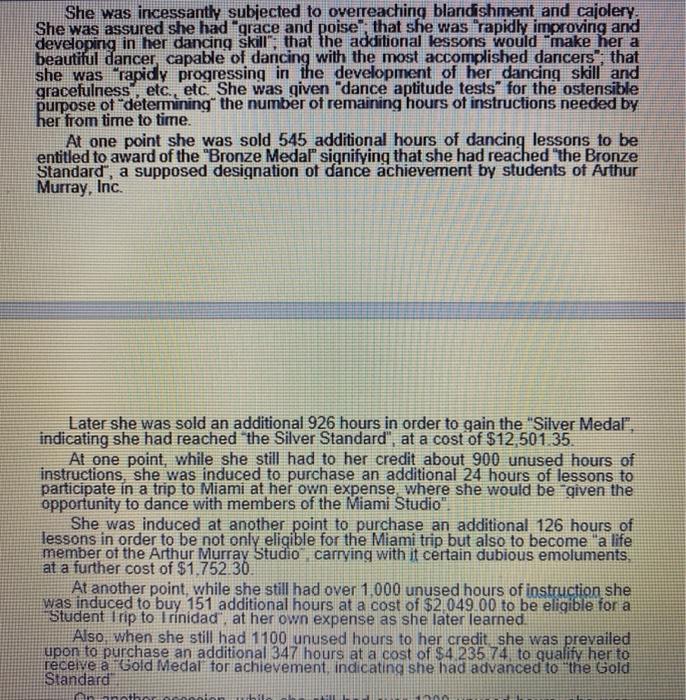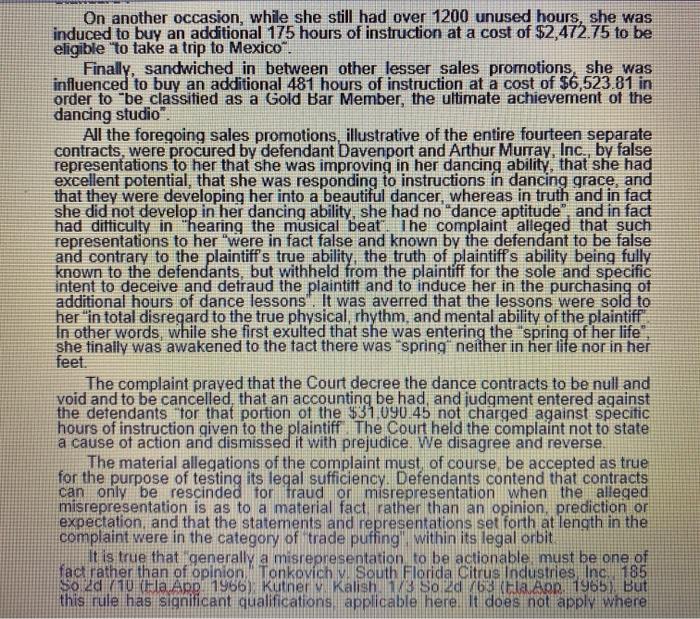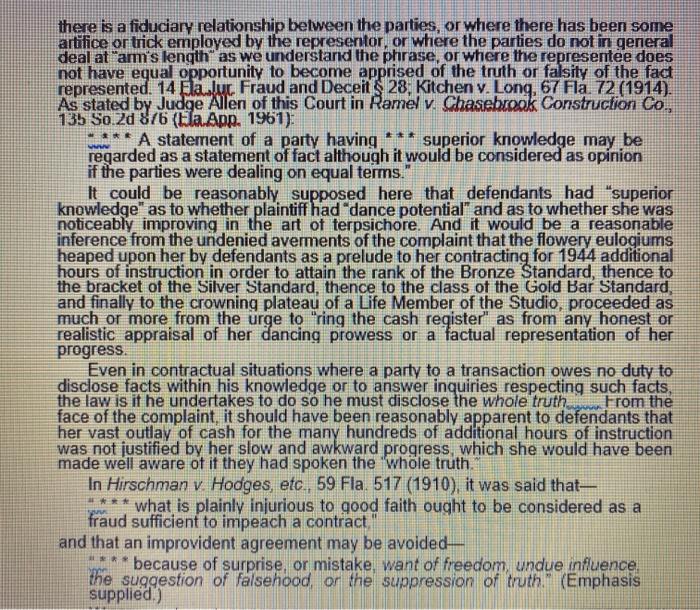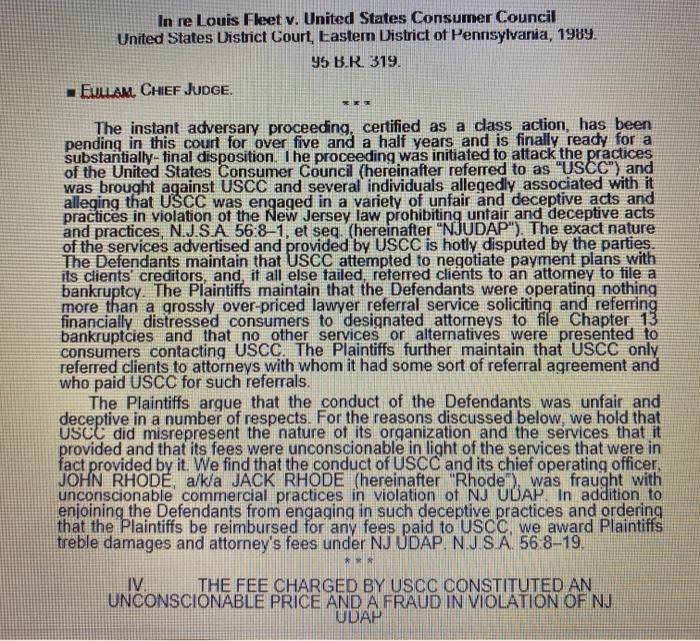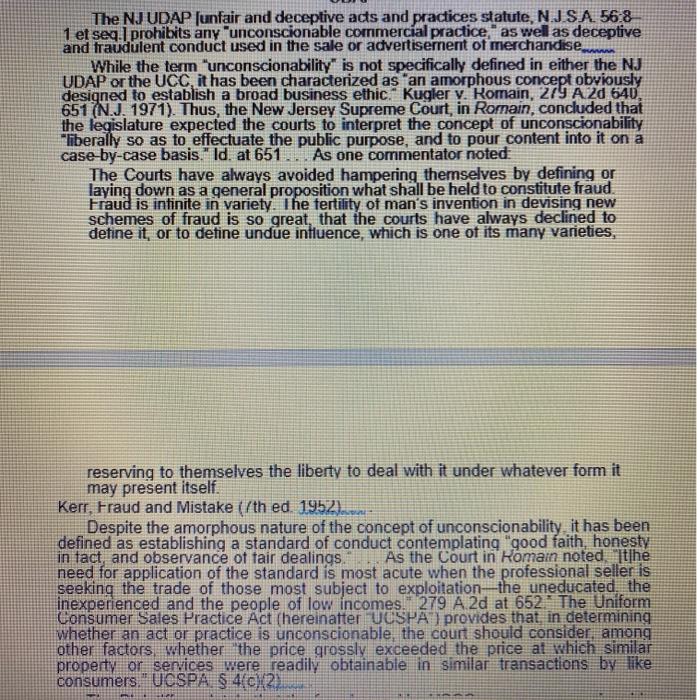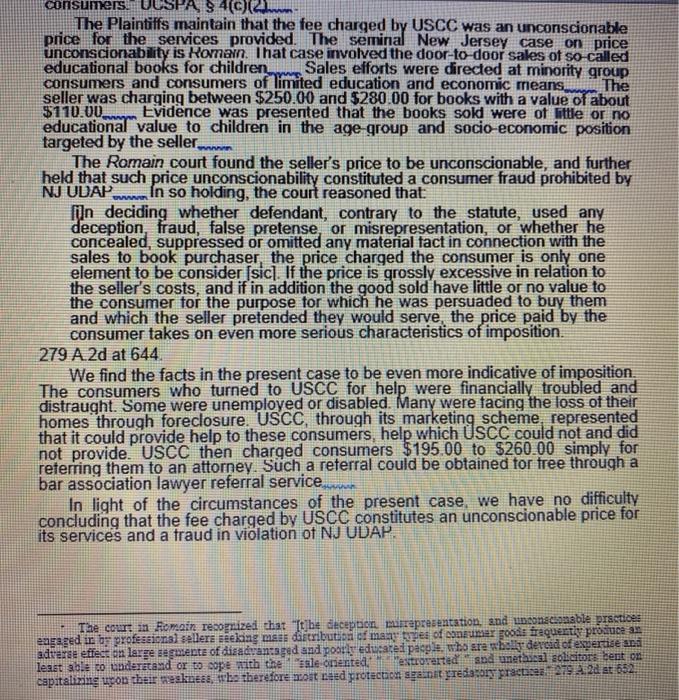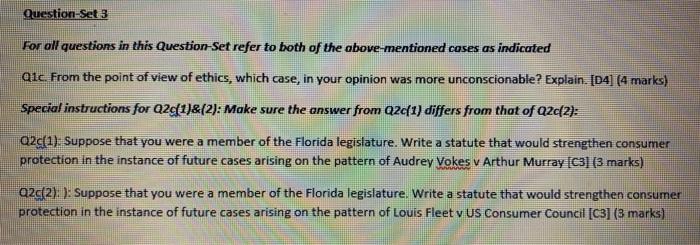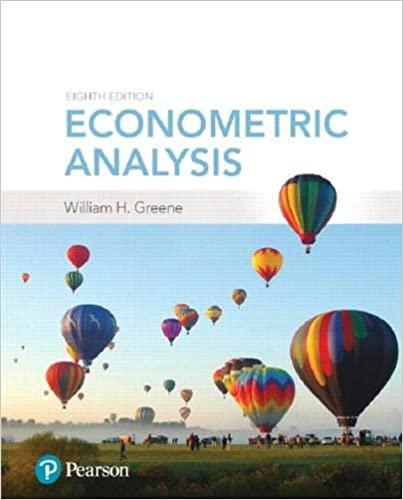I NEED ANSWERS AS SOON AS POSSIBLE PLEEASSEE! THIS IS IMPORTANT
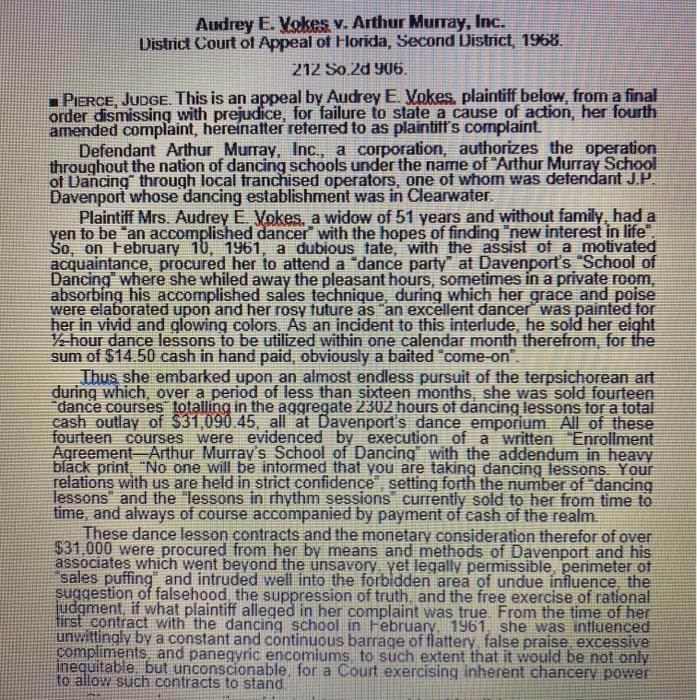
Audrey E. Vokes. v. Arthur Murray, Inc. District Court of Appeal of Florida, Second District, 1968. 212 So.2d 906. - PIERCE, JUDGE. This is an appeal by Audrey E. Vokes, plaintiff below, from a final order dismissing with prejudice, for failure to state a cause of action, her fourth amended complaint, hereinafter referred to as plaintiff's complaint. Defendant Arthur Murray, Inc., a corporation, authorizes the operation throughout the nation of dancing schools under the name of "Arthur Murray School of Dancing through local franchised operators, one of whom was defendant J.P. Davenport whose dancing establishment was in Clearwater Plaintiff Mrs. Audrey E Vokes, a widow of 51 years and without family, had a yen to be "an accomplished dancer with the hopes of finding "new interest in life". So, on February 10, 1961, a dubious tate, with the assist of a motivated acquaintance, procured her to attend a dance party at Davenport's "School of Dancing where she whiled away the pleasant hours, sometimes in a private room, absorbing his accomplished sales technique, during which her grace and poise were elaborated upon and her rosy future as an excellent dancer was painted for her in vivid and glowing colors. As an incident to this interlude he sold her eight v-hour dance lessons to be utilized within one calendar month therefrom, for the sum of $14.50 cash in hand paid, obviously a baited come-on". Thus she embarked upon an almost endless pursuit of the terpsichorean art during which, over a period of less than sixteen months, she was sold fourteen dance courses totalling in the aggregate 2302 hours of dancing lessons for a total cash outlay of $31,090.45, all at Davenport's dance emporium. All of these fourteen courses were evidenced by execution of a written "Enrollment Agreement-Arthur Murray's School of Dancing" with the addendum in heavy black print "No one will be informed that you are taking dancing lessons. Your relations with us are held in strict confidence setting forth the number of "dancing lessons" and the lessons in rhythm sessions" currently sold to her from time to time, and always of course accompanied by payment of cash of the realm. These dance lesson contracts and the monetary consideration therefor of over $31.000 were procured from her by means and methods of Davenport and his associates which went beyond the unsavory, yet legally permissible perimeter of "sales puffing" and intruded well into the forbidden area of undue influence, the suggestion of falsehood the suppression of truth and the free exercise of rational judgment if what plaintiff alleged in her complaint was true From the time of her first contract with the dancing school in February 1961, she was influenced unwittingly by a constant and continuous barrage of flattery false praise excessive compliments and panegyric encomiums to such extent that it would be not only inequitable, but unconscionable, for a Court exercising inherent chancery power to allow such contracts to stand She was incessantly subjected to overreaching blandishment and cajolery. She was assured she had "grace and poise" that she was "rapidly improving and developing in her dancing skill", that the additional lessons would make her a beautiful dancer capable of dancing with the most accomplished dancers", that she was "rapidy progressing in the development of her dancing skill' and gracefulness, etc., etc. She was given "dance aptitude tests for the ostensible purpose of "determining the number of remaining hours of instructions needed by her from time to time. At one point she was sold 545 additional hours of dancing lessons to be entitled to award of the "Bronze Medal signifying that she had reached the Bronze Standard", a supposed designation of dance achievement by students of Arthur Murray, Inc. Later she was sold an additional 926 hours in order to gain the "Silver Medal". indicating she had reached the Silver Standard", at a cost of $12,501 35. At one point, while she still had to her credit about 900 unused hours of instructions, she was induced to purchase an additional 24 hours of lessons to participate in a trip to Miami at her own expense where she would be given the opportunity to dance with members of the Miami Studio". She was induced at another point to purchase an additional 126 hours of lessons in order to be not only eligible for the Miami trip but also to become a life member of the Arthur Murray Studio carrying with it certain dubious emoluments. at a further cost of $1.752.30. At another point, while she still had over 1,000 unused hours of instruction she was induced to buy 151 additional hours at a cost of $2.049.00 to be eligible for a Student Trip to Trinidad", at her own expense as she later learned Also, when she still had 1100 unused hours to her credit she was prevailed upon to purchase an additional 347 hours at a cost of $4.235.74 to qualify her to receive a "Gold Medal for achievement indicating she had advanced to the Gold Standard Anannthornion hito On another occasion, while she still had over 1200 unused hours, she was induced to buy an additional 175 hours of instruction at a cost of $2,472.75 to be eligible to take a trip to Mexico Finally, sandwiched in between other lesser sales promotions, she was influenced to buy an additional 481 hours of instruction at a cost of $6,523 81 in order to be classified as a Gold Bar Member, the ultimate achievement of the dancing studio" All the foregoing sales promotions, illustrative of the entire fourteen separate contracts, were procured by defendant Davenport and Arthur Murray, Inc., by false representations to her that she was improving in her dancing ability, that she had excellent potential, that she was responding to instructions in dancing grace, and that they were developing her into a beautiful dancer, whereas in truth and in fact she did not develop in her dancing ability, she had no "dance aptitude and in fact had difficulty in hearing the musical beat. The complaint alleged that such representations to her "were in fact false and known by the defendant to be false and contrary to the plaintiffs true ability, the truth of plaintiffs ability being fully known to the defendants, but withheld from the plaintiff for the sole and specific intent to deceive and defraud the plaintiff and to induce her in the purchasing of additional hours of dance lessons. It was averred that the lessons were sold to her in total disregard to the true physical, rhythm and mental ability of the plaintiff In other words, while she first exulted that she was entering the spring of her life, she finally was awakened to the fact there was spring neither in her life nor in her feet. The complaint prayed that the Court decree the dance contracts to be null and void and to be cancelled that an accounting be had, and judgment entered against the detendants for that portion of the $31.090.45 not charged against specific hours of instruction given to the plaintiff The Court held the complaint not to state a cause of action and dismissed it with prejudice. We disagree and reverse The material allegations of the complaint must of course, be accepted as true for the purpose of testing its leqal sufficiency. Defendants contend that contracts can only be rescinded for fraud or misrepresentation when the alleged misrepresentation is as to a material fact rather than an opinion, prediction or expectation, and that the statements and representations set forth at length in the complaint were in the category of trade puffing" within its legal orbit It is true that generally a misrepresentation to be actionable must be one of fact rather than of opinion Tonkovich v South Florida Citrus Industries, Inc. 185 So 20 /10 (Fla App 1966), Kutner w Kalish S02263 (tla ADR, 1965). But this rule has significant qualifications, applicable here. It does not apply where there is a fiduciary relationship between the parties, or where there has been some artifice or trick employed by the representor, or where the parties do not in general deal at am's length as we understand the phrase, or where the representee does not have equal opportunity to become apprised of the truth or falsity of the fad represented 14 lalur Fraud and Deceit 28, Kitchen v. Long, 67 Fla 72 (1914). As stated by Judge Allen of this Court in Ramel v Chasebrook Construction Co., 135 So. 2d 876 (bla. App. 1961): ** A statement of a party having superior knowledge may be regarded as a statement of fact although it would be considered as opinion if the parties were dealing on equal terms." It could be reasonably supposed here that defendants had "superior knowledge" as to whether plaintiff had dance potential and as to whether she was noticeably improving in the art of terpsichore. And it would be a reasonable inference from the undenied avements of the complaint that the flowery eulogiums heaped upon her by defendants as a prelude to her contracting for 1944 additional hours of instruction in order to attain the rank of the Bronze Standard, thence to the bracket of the Silver Standard, thence to the class of the Gold Bar Standard, and finally to the crowning plateau of a Life Member of the Studio, proceeded as much or more from the urge to "ring the cash register" as from any honest or realistic appraisal of her dancing prowess or a factual representation of her progress. Even in contractual situations where a party to a transaction owes no duty to disclose facts within his knowledge or to answer inquiries respecting such facts, the law is it he undertakes to do so he must disclose the whole truth From the face of the complaint, it should have been reasonably apparent to defendants that her vast outlay of cash for the many hundreds of additional hours of instruction was not justified by her slow and awkward progress which she would have been made well aware of it they had spoken the whole truth. In Hirschman v Hodges, etc., 59 Fla. 517 (1910), it was said that- *** what is plainly injurious to good faith ought to be considered as a fraud sufficient to impeach a contract and that an improvident agreement may be avoided because of surprise, or mistake, want of freedom, undue influence the suggestion of Falsehood, or the suppression of truth (Emphasis supplied.) We repeat that where parties are dealing on a contractual basis at arm's length with no inequities or inherently unfair practices employed, the Courts will in general leave the parties where they find themselves. But in the case sub judice, from the allegations of the unanswered complaint, we cannot say that enough of the accompanying ingredients, as mentioned in the foregoing authorities, were not present which otherwise would have barred the equitable arm of the Court to her. In our view, from the showing made in her complaint, plaintift is entitled to her day in Court It accordingly follows that the order dismissing plaintiffs last amended complaint with prejudice should be and is reversed. Reversed. In re Louis Fleet v. United States Consumer Council United States District Court, Eastern District of Pennsylvania, 1989. 95 B.R. 319 EULLAM. CHIEF JUDGE. The instant adversary proceeding, certified as a class action, has been pending in this court for over five and a half years and is finally ready for a substantially-final disposition. The proceeding was initiated to attack the practices of the United States Consumer Council (hereinafter referred to as "USCC") and was brought against USCC and several individuals allegedly associated with it alleging that USCC was engaged in a variety of unfair and deceptive acts and practices in violation of the New Jersey law prohibiting unfair and deceptive acts and practices, N.J.S.A. 56.8-1. et seq. (hereinafter "NJUDAP"). The exact nature of the services advertised and provided by USCC is hotly disputed by the parties. The Defendants maintain that USCC attempted to negotiate payment plans with its clients' creditors, and, it all else tailed, referred clients to an attorney to file a bankruptcy. The Plaintiffs maintain that the Defendants were operating nothing more than a grossly over-priced lawyer referral service soliciting and referring financially distressed consumers to designated attorneys to file Chapter 13 bankruptcies and that no other services or alternatives were presented to consumers contacting USCC, The Plaintiffs further maintain that USCC only referred clients to attorneys with whom it had some sort of referral agreement and who paid USCC for such referrals. The Plaintiffs argue that the conduct of the Defendants was unfair and deceptive in a number of respects. For the reasons discussed below, we hold that USCC did misrepresent the nature of its organization and the services that it provided and that its fees were unconscionable in light of the services that were in fact provided by it. We find that the conduct of USCC and its chief operating officer, JOHN RHODE, a/k/a JACK RHODE (hereinafter "Rhode), was fraught with unconscionable commercial practices in violation of NJ UDAP. In addition to enjoining the Defendants from engaging in such deceptive practices and ordering that the plaintiffs be reimbursed for any fees paid to USCC we award Plaintiffs treble damages and attorney's fees under NJ UDAP. N.J.S.A. 56 819. TV UNCONSCIONABLE PRICE AND A FRAUD IN VIOLATION OF NJ UDAP The NJUDAP unfair and deceptive acts and practices statute, NJSA 568 1 et seq. I prohibits any unconscionable commercial practice, as well as deceptive and fraudulent conduct used in the sale or advertisement of merchandise While the term "unconscionability is not specifically defined in either the NJ UDAP or the UCC, it has been characterized as an amorphous concept obviously designed to establish a broad business ethic." Kugler v. Romain, 279 A 2d 640, 651 (N.J. 1971). Thus, the New Jersey Supreme Court in Romain, concluded that the legislature expected the courts to interpret the concept of unconscionability "liberally so as to effectuate the public purpose, and to pour content into it on a case by-case basis." ld. at 651 As one commentator noted The Courts have always avoided hampering themselves by defining or laying down as a general proposition what shall be held to constitute fraud. Fraud is infinite in variety. The fertility of man's invention in devising new schemes of fraud is so great, that the courts have always declined to detine it or to define undue influence, which is one of its many varieties, reserving to themselves the liberty to deal with it under whatever form it may present itself. Kerr, Fraud and Mistake (7th ed 1952) Despite the amorphous nature of the concept of unconscionability it has been defined as establishing a standard of conduct contemplating good faith, honesty in fact and observance of fair dealings. As the Court in Romain noted the need for application of the standard is most acute when the professional seller is seeking the trade of those most subject to exploitation the uneducated, the inexperienced and the people of low incomes." 279 A 2d at 652 The Uniform Consumer Sales Practice Act (hereinatter UCSPA) provides that in determining whether an act or practice is unconscionable, the court should consider, among other factors, whether the price grossly exceeded the price at which similar property or services were readily obtainable in similar transactions by like consumers." UOSPA, S 4(CH2) min UW consumers. ULSPA 94cm The Plaintiffs maintain that the fee charged by USCC was an unconscionable price for the services provided. The seminal New Jersey case on price unconscionability is Roman. That case involved the door-to-door sales of so called educational books for children Sales efforts were directed at minority group consumers and consumers of limited education and economic means The seller was charging between $250.00 and $280.00 for books with a value of about $110.00 Evidence was presented that the books sold were of little or no educational value to children in the age group and socio-economic position targeted by the seller The Romain court found the seller's price to be unconscionable, and further held that such price unconscionability constituted a consumer fraud prohibited by NJ UDAP In so holding, the court reasoned that: fjln deciding whether defendant, contrary to the statute, used any deception fraud, false pretense, or misrepresentation, or whether he concealed suppressed or omitted any material fact in connection with the sales to book purchaser, the price charged the consumer is only one element to be consider (sic). If the price is grossly excessive in relation to the seller's costs, and if in addition the good sold have little or no value to the consumer for the purpose for which he was persuaded to buy them and which the seller pretended they would serve the price paid by the consumer takes on even more serious characteristics of imposition. 279 A2d at 644 We find the facts in the present case to be even more indicative of imposition, The consumers who turned to USCC for help were financially troubled and distraught. Some were unemployed or disabled. Many were facing the loss of their homes through foreclosure. USCC, through its marketing scheme, represented that it could provide help to these consumers, help which USCC could not and did not provide. USCC then charged consumers $195.00 to $260.00 simply for referring them to an attorney. Such a referral could be obtained for free through a bar association lawyer referral service, In light of the circumstances of the present case, we have no difficulty concluding that the fee charged by USCC constitutes an unconscionable price for its services and a fraud in violation of NJ UDAP. The course in Romain recognized that "It be deception mirrepresentation, and unconscionable practices engaged in by professional selere seeking maar ditribution of many tubes of consumer goods frequently produce an adverse effect on large segments of disadvantaged and poorly educated people who are wholdereid of expertise an least able to understand or to cope with the sale oriented, extroverted and unethical solicitors bent on capitalizing upon their weakness, the therefore most beed protection Szanit gredatory practice 279 28 at 652. *** NJ UDAP also provides that, when a practice is found to be unlawful under the Act, then the court shall award treble damages plus attorneys fees, filing fees and reasonable costs to any person who has suttered any ascertainable loss of moneys or property. N.J.S.A. 56:8-19 We therefore conclude that assessment of such damages and costs is not only appropriate but statutorily mandated in the present matter, *** www Question-Set 3 For oll questions in this Question-Set refer to both of the above-mentioned coses as indicated qic. From the point of view of ethics, which case, in your opinion was more unconscionable? Explain. [14] (4 marks) Special instructions for Q21)&(2): Make sure the answer from Q2c1) differs from thot of Q2c(2): Q20(1). Suppose that you were a member of the Florida legislature. Write a statute that would strengthen consumer protection in the instance of future cases arising on the pattern of Audrey Vokes v Arthur Murray (C3) (3 marks) 920(2):): Suppose that you were a member of the Florida legislature. Write a statute that would strengthen consumer protection in the instance of future cases arising on the pattern of Louis Fleet v US Consumer Council [C3] (8 marks) Audrey E. Vokes. v. Arthur Murray, Inc. District Court of Appeal of Florida, Second District, 1968. 212 So.2d 906. - PIERCE, JUDGE. This is an appeal by Audrey E. Vokes, plaintiff below, from a final order dismissing with prejudice, for failure to state a cause of action, her fourth amended complaint, hereinafter referred to as plaintiff's complaint. Defendant Arthur Murray, Inc., a corporation, authorizes the operation throughout the nation of dancing schools under the name of "Arthur Murray School of Dancing through local franchised operators, one of whom was defendant J.P. Davenport whose dancing establishment was in Clearwater Plaintiff Mrs. Audrey E Vokes, a widow of 51 years and without family, had a yen to be "an accomplished dancer with the hopes of finding "new interest in life". So, on February 10, 1961, a dubious tate, with the assist of a motivated acquaintance, procured her to attend a dance party at Davenport's "School of Dancing where she whiled away the pleasant hours, sometimes in a private room, absorbing his accomplished sales technique, during which her grace and poise were elaborated upon and her rosy future as an excellent dancer was painted for her in vivid and glowing colors. As an incident to this interlude he sold her eight v-hour dance lessons to be utilized within one calendar month therefrom, for the sum of $14.50 cash in hand paid, obviously a baited come-on". Thus she embarked upon an almost endless pursuit of the terpsichorean art during which, over a period of less than sixteen months, she was sold fourteen dance courses totalling in the aggregate 2302 hours of dancing lessons for a total cash outlay of $31,090.45, all at Davenport's dance emporium. All of these fourteen courses were evidenced by execution of a written "Enrollment Agreement-Arthur Murray's School of Dancing" with the addendum in heavy black print "No one will be informed that you are taking dancing lessons. Your relations with us are held in strict confidence setting forth the number of "dancing lessons" and the lessons in rhythm sessions" currently sold to her from time to time, and always of course accompanied by payment of cash of the realm. These dance lesson contracts and the monetary consideration therefor of over $31.000 were procured from her by means and methods of Davenport and his associates which went beyond the unsavory, yet legally permissible perimeter of "sales puffing" and intruded well into the forbidden area of undue influence, the suggestion of falsehood the suppression of truth and the free exercise of rational judgment if what plaintiff alleged in her complaint was true From the time of her first contract with the dancing school in February 1961, she was influenced unwittingly by a constant and continuous barrage of flattery false praise excessive compliments and panegyric encomiums to such extent that it would be not only inequitable, but unconscionable, for a Court exercising inherent chancery power to allow such contracts to stand She was incessantly subjected to overreaching blandishment and cajolery. She was assured she had "grace and poise" that she was "rapidly improving and developing in her dancing skill", that the additional lessons would make her a beautiful dancer capable of dancing with the most accomplished dancers", that she was "rapidy progressing in the development of her dancing skill' and gracefulness, etc., etc. She was given "dance aptitude tests for the ostensible purpose of "determining the number of remaining hours of instructions needed by her from time to time. At one point she was sold 545 additional hours of dancing lessons to be entitled to award of the "Bronze Medal signifying that she had reached the Bronze Standard", a supposed designation of dance achievement by students of Arthur Murray, Inc. Later she was sold an additional 926 hours in order to gain the "Silver Medal". indicating she had reached the Silver Standard", at a cost of $12,501 35. At one point, while she still had to her credit about 900 unused hours of instructions, she was induced to purchase an additional 24 hours of lessons to participate in a trip to Miami at her own expense where she would be given the opportunity to dance with members of the Miami Studio". She was induced at another point to purchase an additional 126 hours of lessons in order to be not only eligible for the Miami trip but also to become a life member of the Arthur Murray Studio carrying with it certain dubious emoluments. at a further cost of $1.752.30. At another point, while she still had over 1,000 unused hours of instruction she was induced to buy 151 additional hours at a cost of $2.049.00 to be eligible for a Student Trip to Trinidad", at her own expense as she later learned Also, when she still had 1100 unused hours to her credit she was prevailed upon to purchase an additional 347 hours at a cost of $4.235.74 to qualify her to receive a "Gold Medal for achievement indicating she had advanced to the Gold Standard Anannthornion hito On another occasion, while she still had over 1200 unused hours, she was induced to buy an additional 175 hours of instruction at a cost of $2,472.75 to be eligible to take a trip to Mexico Finally, sandwiched in between other lesser sales promotions, she was influenced to buy an additional 481 hours of instruction at a cost of $6,523 81 in order to be classified as a Gold Bar Member, the ultimate achievement of the dancing studio" All the foregoing sales promotions, illustrative of the entire fourteen separate contracts, were procured by defendant Davenport and Arthur Murray, Inc., by false representations to her that she was improving in her dancing ability, that she had excellent potential, that she was responding to instructions in dancing grace, and that they were developing her into a beautiful dancer, whereas in truth and in fact she did not develop in her dancing ability, she had no "dance aptitude and in fact had difficulty in hearing the musical beat. The complaint alleged that such representations to her "were in fact false and known by the defendant to be false and contrary to the plaintiffs true ability, the truth of plaintiffs ability being fully known to the defendants, but withheld from the plaintiff for the sole and specific intent to deceive and defraud the plaintiff and to induce her in the purchasing of additional hours of dance lessons. It was averred that the lessons were sold to her in total disregard to the true physical, rhythm and mental ability of the plaintiff In other words, while she first exulted that she was entering the spring of her life, she finally was awakened to the fact there was spring neither in her life nor in her feet. The complaint prayed that the Court decree the dance contracts to be null and void and to be cancelled that an accounting be had, and judgment entered against the detendants for that portion of the $31.090.45 not charged against specific hours of instruction given to the plaintiff The Court held the complaint not to state a cause of action and dismissed it with prejudice. We disagree and reverse The material allegations of the complaint must of course, be accepted as true for the purpose of testing its leqal sufficiency. Defendants contend that contracts can only be rescinded for fraud or misrepresentation when the alleged misrepresentation is as to a material fact rather than an opinion, prediction or expectation, and that the statements and representations set forth at length in the complaint were in the category of trade puffing" within its legal orbit It is true that generally a misrepresentation to be actionable must be one of fact rather than of opinion Tonkovich v South Florida Citrus Industries, Inc. 185 So 20 /10 (Fla App 1966), Kutner w Kalish S02263 (tla ADR, 1965). But this rule has significant qualifications, applicable here. It does not apply where there is a fiduciary relationship between the parties, or where there has been some artifice or trick employed by the representor, or where the parties do not in general deal at am's length as we understand the phrase, or where the representee does not have equal opportunity to become apprised of the truth or falsity of the fad represented 14 lalur Fraud and Deceit 28, Kitchen v. Long, 67 Fla 72 (1914). As stated by Judge Allen of this Court in Ramel v Chasebrook Construction Co., 135 So. 2d 876 (bla. App. 1961): ** A statement of a party having superior knowledge may be regarded as a statement of fact although it would be considered as opinion if the parties were dealing on equal terms." It could be reasonably supposed here that defendants had "superior knowledge" as to whether plaintiff had dance potential and as to whether she was noticeably improving in the art of terpsichore. And it would be a reasonable inference from the undenied avements of the complaint that the flowery eulogiums heaped upon her by defendants as a prelude to her contracting for 1944 additional hours of instruction in order to attain the rank of the Bronze Standard, thence to the bracket of the Silver Standard, thence to the class of the Gold Bar Standard, and finally to the crowning plateau of a Life Member of the Studio, proceeded as much or more from the urge to "ring the cash register" as from any honest or realistic appraisal of her dancing prowess or a factual representation of her progress. Even in contractual situations where a party to a transaction owes no duty to disclose facts within his knowledge or to answer inquiries respecting such facts, the law is it he undertakes to do so he must disclose the whole truth From the face of the complaint, it should have been reasonably apparent to defendants that her vast outlay of cash for the many hundreds of additional hours of instruction was not justified by her slow and awkward progress which she would have been made well aware of it they had spoken the whole truth. In Hirschman v Hodges, etc., 59 Fla. 517 (1910), it was said that- *** what is plainly injurious to good faith ought to be considered as a fraud sufficient to impeach a contract and that an improvident agreement may be avoided because of surprise, or mistake, want of freedom, undue influence the suggestion of Falsehood, or the suppression of truth (Emphasis supplied.) We repeat that where parties are dealing on a contractual basis at arm's length with no inequities or inherently unfair practices employed, the Courts will in general leave the parties where they find themselves. But in the case sub judice, from the allegations of the unanswered complaint, we cannot say that enough of the accompanying ingredients, as mentioned in the foregoing authorities, were not present which otherwise would have barred the equitable arm of the Court to her. In our view, from the showing made in her complaint, plaintift is entitled to her day in Court It accordingly follows that the order dismissing plaintiffs last amended complaint with prejudice should be and is reversed. Reversed. In re Louis Fleet v. United States Consumer Council United States District Court, Eastern District of Pennsylvania, 1989. 95 B.R. 319 EULLAM. CHIEF JUDGE. The instant adversary proceeding, certified as a class action, has been pending in this court for over five and a half years and is finally ready for a substantially-final disposition. The proceeding was initiated to attack the practices of the United States Consumer Council (hereinafter referred to as "USCC") and was brought against USCC and several individuals allegedly associated with it alleging that USCC was engaged in a variety of unfair and deceptive acts and practices in violation of the New Jersey law prohibiting unfair and deceptive acts and practices, N.J.S.A. 56.8-1. et seq. (hereinafter "NJUDAP"). The exact nature of the services advertised and provided by USCC is hotly disputed by the parties. The Defendants maintain that USCC attempted to negotiate payment plans with its clients' creditors, and, it all else tailed, referred clients to an attorney to file a bankruptcy. The Plaintiffs maintain that the Defendants were operating nothing more than a grossly over-priced lawyer referral service soliciting and referring financially distressed consumers to designated attorneys to file Chapter 13 bankruptcies and that no other services or alternatives were presented to consumers contacting USCC, The Plaintiffs further maintain that USCC only referred clients to attorneys with whom it had some sort of referral agreement and who paid USCC for such referrals. The Plaintiffs argue that the conduct of the Defendants was unfair and deceptive in a number of respects. For the reasons discussed below, we hold that USCC did misrepresent the nature of its organization and the services that it provided and that its fees were unconscionable in light of the services that were in fact provided by it. We find that the conduct of USCC and its chief operating officer, JOHN RHODE, a/k/a JACK RHODE (hereinafter "Rhode), was fraught with unconscionable commercial practices in violation of NJ UDAP. In addition to enjoining the Defendants from engaging in such deceptive practices and ordering that the plaintiffs be reimbursed for any fees paid to USCC we award Plaintiffs treble damages and attorney's fees under NJ UDAP. N.J.S.A. 56 819. TV UNCONSCIONABLE PRICE AND A FRAUD IN VIOLATION OF NJ UDAP The NJUDAP unfair and deceptive acts and practices statute, NJSA 568 1 et seq. I prohibits any unconscionable commercial practice, as well as deceptive and fraudulent conduct used in the sale or advertisement of merchandise While the term "unconscionability is not specifically defined in either the NJ UDAP or the UCC, it has been characterized as an amorphous concept obviously designed to establish a broad business ethic." Kugler v. Romain, 279 A 2d 640, 651 (N.J. 1971). Thus, the New Jersey Supreme Court in Romain, concluded that the legislature expected the courts to interpret the concept of unconscionability "liberally so as to effectuate the public purpose, and to pour content into it on a case by-case basis." ld. at 651 As one commentator noted The Courts have always avoided hampering themselves by defining or laying down as a general proposition what shall be held to constitute fraud. Fraud is infinite in variety. The fertility of man's invention in devising new schemes of fraud is so great, that the courts have always declined to detine it or to define undue influence, which is one of its many varieties, reserving to themselves the liberty to deal with it under whatever form it may present itself. Kerr, Fraud and Mistake (7th ed 1952) Despite the amorphous nature of the concept of unconscionability it has been defined as establishing a standard of conduct contemplating good faith, honesty in fact and observance of fair dealings. As the Court in Romain noted the need for application of the standard is most acute when the professional seller is seeking the trade of those most subject to exploitation the uneducated, the inexperienced and the people of low incomes." 279 A 2d at 652 The Uniform Consumer Sales Practice Act (hereinatter UCSPA) provides that in determining whether an act or practice is unconscionable, the court should consider, among other factors, whether the price grossly exceeded the price at which similar property or services were readily obtainable in similar transactions by like consumers." UOSPA, S 4(CH2) min UW consumers. ULSPA 94cm The Plaintiffs maintain that the fee charged by USCC was an unconscionable price for the services provided. The seminal New Jersey case on price unconscionability is Roman. That case involved the door-to-door sales of so called educational books for children Sales efforts were directed at minority group consumers and consumers of limited education and economic means The seller was charging between $250.00 and $280.00 for books with a value of about $110.00 Evidence was presented that the books sold were of little or no educational value to children in the age group and socio-economic position targeted by the seller The Romain court found the seller's price to be unconscionable, and further held that such price unconscionability constituted a consumer fraud prohibited by NJ UDAP In so holding, the court reasoned that: fjln deciding whether defendant, contrary to the statute, used any deception fraud, false pretense, or misrepresentation, or whether he concealed suppressed or omitted any material fact in connection with the sales to book purchaser, the price charged the consumer is only one element to be consider (sic). If the price is grossly excessive in relation to the seller's costs, and if in addition the good sold have little or no value to the consumer for the purpose for which he was persuaded to buy them and which the seller pretended they would serve the price paid by the consumer takes on even more serious characteristics of imposition. 279 A2d at 644 We find the facts in the present case to be even more indicative of imposition, The consumers who turned to USCC for help were financially troubled and distraught. Some were unemployed or disabled. Many were facing the loss of their homes through foreclosure. USCC, through its marketing scheme, represented that it could provide help to these consumers, help which USCC could not and did not provide. USCC then charged consumers $195.00 to $260.00 simply for referring them to an attorney. Such a referral could be obtained for free through a bar association lawyer referral service, In light of the circumstances of the present case, we have no difficulty concluding that the fee charged by USCC constitutes an unconscionable price for its services and a fraud in violation of NJ UDAP. The course in Romain recognized that "It be deception mirrepresentation, and unconscionable practices engaged in by professional selere seeking maar ditribution of many tubes of consumer goods frequently produce an adverse effect on large segments of disadvantaged and poorly educated people who are wholdereid of expertise an least able to understand or to cope with the sale oriented, extroverted and unethical solicitors bent on capitalizing upon their weakness, the therefore most beed protection Szanit gredatory practice 279 28 at 652. *** NJ UDAP also provides that, when a practice is found to be unlawful under the Act, then the court shall award treble damages plus attorneys fees, filing fees and reasonable costs to any person who has suttered any ascertainable loss of moneys or property. N.J.S.A. 56:8-19 We therefore conclude that assessment of such damages and costs is not only appropriate but statutorily mandated in the present matter, *** www Question-Set 3 For oll questions in this Question-Set refer to both of the above-mentioned coses as indicated qic. From the point of view of ethics, which case, in your opinion was more unconscionable? Explain. [14] (4 marks) Special instructions for Q21)&(2): Make sure the answer from Q2c1) differs from thot of Q2c(2): Q20(1). Suppose that you were a member of the Florida legislature. Write a statute that would strengthen consumer protection in the instance of future cases arising on the pattern of Audrey Vokes v Arthur Murray (C3) (3 marks) 920(2):): Suppose that you were a member of the Florida legislature. Write a statute that would strengthen consumer protection in the instance of future cases arising on the pattern of Louis Fleet v US Consumer Council [C3] (8 marks)


